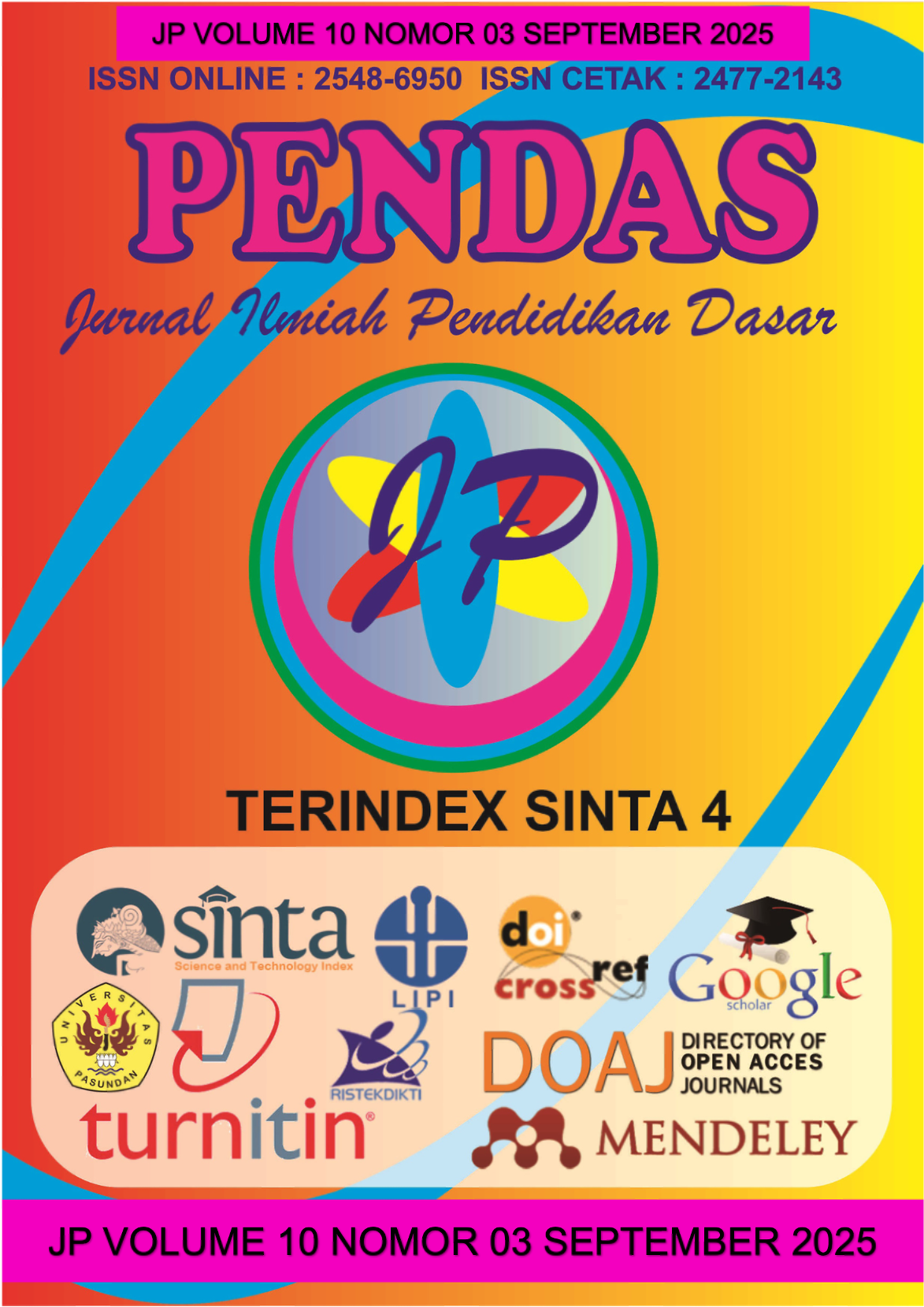MIND MAPPING SEBAGAI KUNCI PENINGKATAN PEMAHAMAN KONSEP PERKEMBANGAN TEKNOLOGI PADA SISWA KELAS 4 SDN 01 BABAKAN
DOI:
https://doi.org/10.23969/jp.v10i03.30991Keywords:
Mind-Mapping, learning outcomes, technological development, elementary educationAbstract
This quasi-experimental pretest–posttest control group study investigated the effect of the Mind Mapping method on learning outcomes for the concept of technological development among fourth-grade students at SDN 01 Babakan. Forty-three students participated: 22 in the experimental group (audio-visual Mind Mapping) and 21 in the control group (image-based elaboration). Valid and reliable instruments were used, and data were analyzed via normality (Kolmogorov–Smirnov) and homogeneity (Levene’s) tests, followed by paired-samples and independent-samples t-tests at α = 0.05. Results showed the experimental group’s mean score increased from 55.00 to 80.00 (gain = 25.00; 45.5 %), while the control group’s mean score rose from 54.50 to 65.00 (gain = 10.50; 19.3 %). Significant improvements were confirmed by the paired-samples t-test (t(21) = 15.32, p < .001, Cohen’s d = 3.26) and the independent-samples t-test (t(41) = 6.45, p < .001, Cohen’s d = 2.03). These findings endorse the integration of Mind Mapping into elementary science instruction. Future research should explore digital Mind Mapping tools, conduct longitudinal studies on retention, and examine moderating factors such as learning styles and technological proficiency.
Downloads
References
Irawati, D., Iqbal, A. M., Hasanah, A., & Arifin, B. S. (2022). Profil Pelajar Pancasila Sebagai Upaya Mewujudkan Karakter Bangsa. Edumaspul: Jurnal Pendidikan, 6(1), 1224–1238. https://doi.org/10.33487/edumaspul.v6i1.3622
Ismail, S., Suhana, S., & Yuliati Zakiah, Q. (2021). Analisis Kebijakan Penguatan Pendidikan Karakter Dalam Mewujudkan Pelajar Pancasila Di Sekolah. Jurnal Manajemen Pendidikan Dan Ilmu Sosial, 2(1), 76–84. https://doi.org/10.38035/jmpis.v2i1.388
Kefalis, C., Skordoulis, C., & Drigas, A. (2025). A Systematic Review of Mind Maps, STEM Education, Algorithmic and Procedural Learning. Computers, 14(6), 1–23. https://doi.org/10.3390/computers14060204
Kemdikbud. (2020). Salinan Permendikbud 22 Tahun 2020. In Salinan Permendikbud 22 Tahun 2020 (Vol. 3). https://jdih.kemdikbud.go.id/arsip/SALINAN PERMENDIKBUD 22 TAHUN 2020.pdf
Munawwarah, & Cahyani, V. P. (2025). Comparing The Effectiveness of Mind Mapping and Summarizing in Enhancing Student Learning Outcomes in Flipped Classroom Model. 8(1), 260–270.
Nur, J., Utami, S., Nuraini, H., & Kurniawan, A. (2024). Meta-analysis Influence of Integrated Mind Mapping Inquiry Based Learning Model on Student Problem Solving Skills. Jurnal Penelitian Pendidikan IPA, 10(3), 116–123. https://doi.org/10.29303/jppipa.v10i3.6804
Sari, F. F. K., Sukarno, & Murwaningsih, T. (2023). The New Paradigm of Merdeka Curriculum: Implementation of Pancasila Education Subject in Elementary School. International Journal of Elementary Education, 7(1), 79–88. https://doi.org/10.23887/ijee.v7i1.54092
Sari, M., Sarah, S., Sulistri, E., & Hendriana, E. C. (2021). The Effect of Mind Mapping Learning Model on Student Cognitive Learning Outcomes in Natural Science Subjects in Grade IV Elementary School. Indonesian Journal of Primary Education, 5(2), 150–158. https://doi.org/10.17509/ijpe.v5i2.40251
Schleicher, A. (2019). PISA 2018: Insight and Interpretations. In OECD.
Shi, Y., Yang, H., Dou, Y., & Zeng, Y. (2023). Effects of mind mapping-based instruction on student cognitive learning outcomes: a meta-analysis. Asia Pacific Education Review, 24(3), 303–317. https://doi.org/10.1007/s12564-022-09746-9
UNESCO. (2022). Berlin Declaration on Education for Sustainable Development; Learn for our planet: act for sustainability. In United Nations Educational, Scientific An Cultural Organization.
UNESCO, & UNICEF. (2021). Gateways to Public Digital Learning Making Digital Education a Public Good. In United Nations. https://www.un.org/en/transforming-education-summit/gateways-public-digital-learning
Utaminingsih, E. S. (2023). Pengembangan E-Modul Berbasis STEAM Topik Peredaran Darah Manusia untuk Meningkatkan Literasi Sains dan Karakter Pelajar Pancasila. Tesis. Universitas Negeri Semarang.
Utaminingsih, E. S., Idammatussilmi, I., Intania, B. Y., & Kristiyuana, K. (2025). An Interactive Qur’anic Values-Based Affective-Learning Approach to Mitigating School Bullying. Suhuf, 37(1), 237–249. https://doi.org/10.23917/suhuf.v37i1.10637
Utaminingsih, E. S., Intania, B. Y., Aida, H., Salama, M. S., & Sukma, I. M. (2024). Designing an Innovative Educational Framework for “How We Live and Grow” Using the 4D Model. Journal of Educational Development, 12(1), 42–52. https://doi.org/10.29303/jipp.v8i4.1752
Downloads
Published
Issue
Section
License
Copyright (c) 2025 Pendas : Jurnal Ilmiah Pendidikan Dasar

This work is licensed under a Creative Commons Attribution 4.0 International License.














































